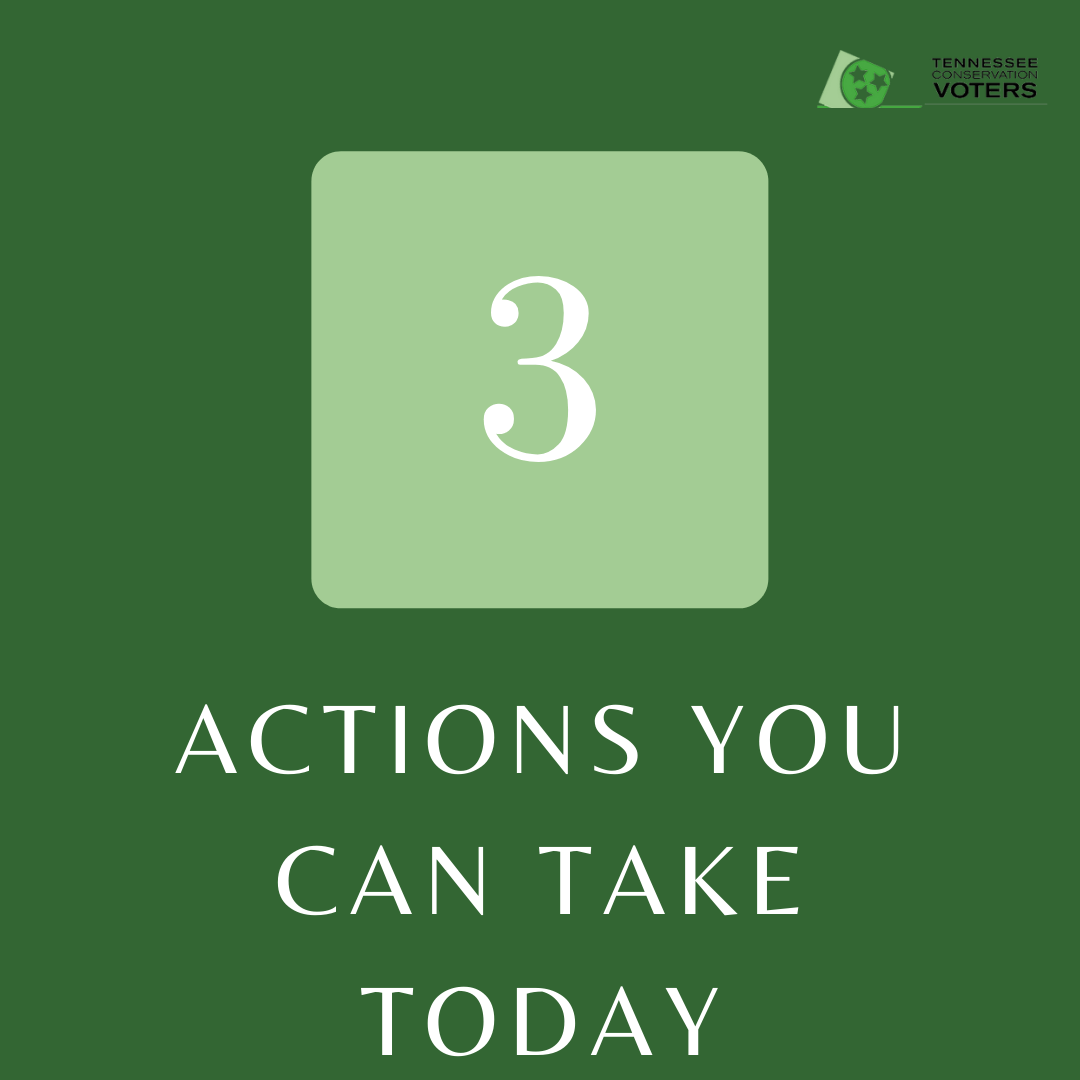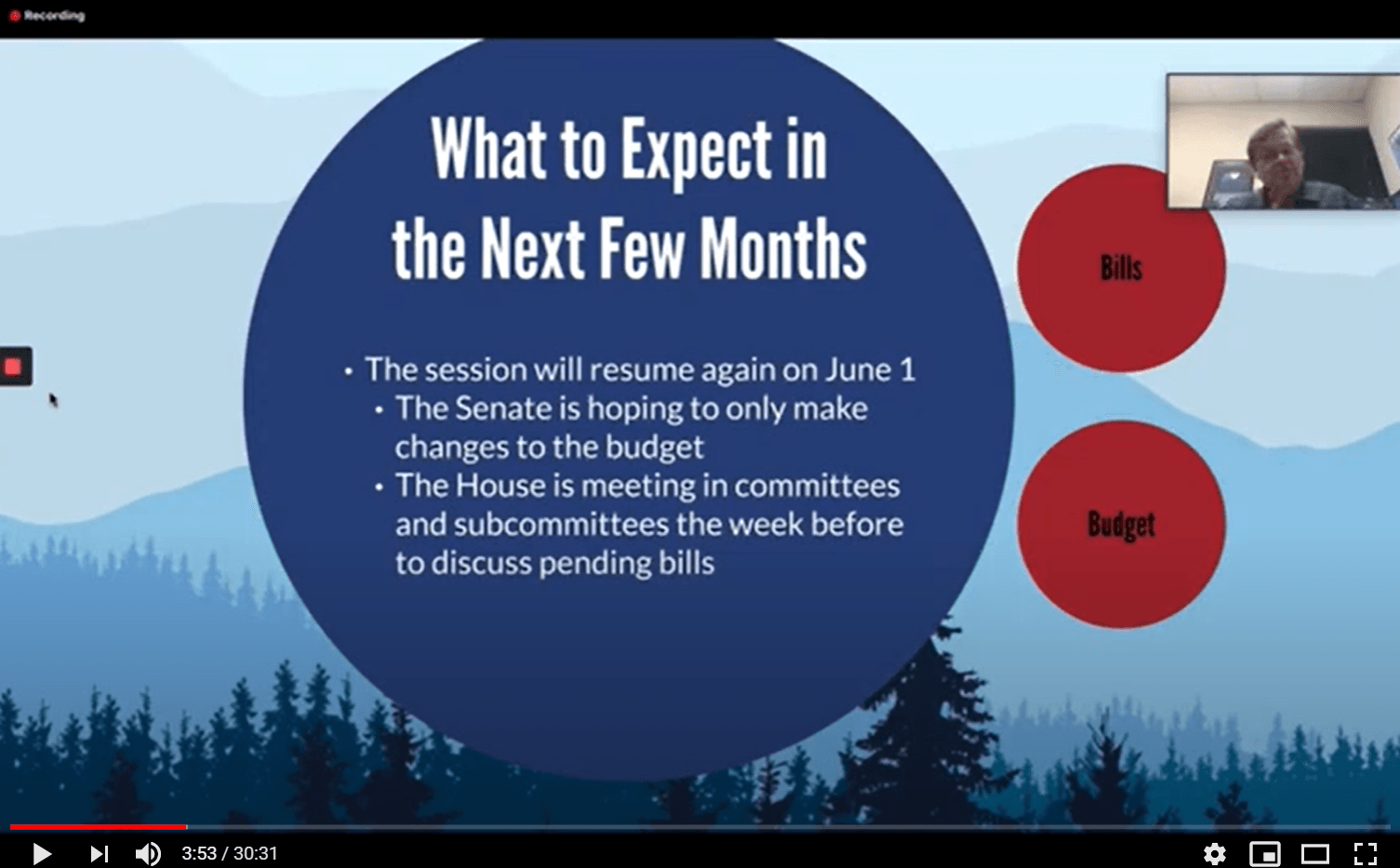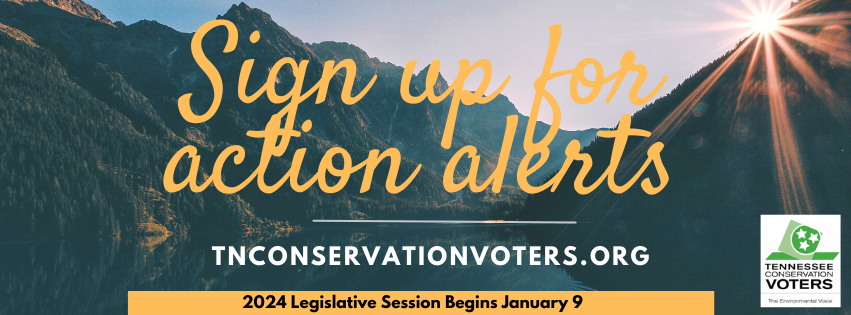Tennessee Conservation Voters
The only statewide, non-partisan, non-profit organization dedicated solely to protecting Tennessee's environment and preserving our natural resources through effective legislative and administrative advocacy.
Read More

News
Blog

Commit to asking at least three people to join our TCV Legislative Emails Update List at https://www.tnconservationvoters.org/sign-up-for-updates . When we are well-organized and informed on conservation issues, our message and impact on legislation is more successful. Send a polite and professional email to your legislators today and when they arrive back in session in January 2022 to let them know you are a constituent, and you care about the environment. No matter how good or bad your legislators’ past votes have been on our issues, they need to know that their constituents care. Find your legislator by going to https://capitol.tn.gov and clicking “Find My Legislator”. Become a monthly donor today or make a one-time gift of $500, $250, or $100. Together, we have the power to build a healthier, more equitable future for everyone in Tennessee! DONATE HERE Mostly importantly, continue working and planning together to make sure we stand unified in the face of unprecedented threats to our environment.

In today’s social and political climate, there are countless injustices and grievances that may spark strong opinions. You may be developing your own personal philosophies and ideas surrounding a variety of topics, and you may feel impassioned and wish to share these thoughts on a broader scale than simply social media or dinner conversation. Perhaps you recently read an article that struck you deeply, that lit a fire within you, and you’ve drafted up a full response in your head. When it comes to an outlet for these feelings, there is no better option than writing a letter to the editor. What is a letter to the editor? While the name suggests it is a message written to the head of a magazine or newspaper, the title simply represents a brief piece of writing, usually persuasive or argumentative, that is written and sent in by a reader of a particular publication. These letters can be a great addition to your personal advocacy and a way to have your voice heard. The ACLU states on their website that “in addition to writing letters to members of Congress, sending letters to the editor is an important advocacy goal because they reach a large audience, are often monitored by elected officials, can bring up information not addressed in a news article, and create an impression of widespread support for or opposition to an issue.” This means that you have the potential to shift the opinion of not only readers but also representatives and policy makers. So, you are fired up and ready to write. What makes a good letter? You may have read op-eds in magazines in the past, or longer essays written by authors with fancy credentials taking clear stances on issues. In contrast to op-eds, letters to the editor are much shorter and often written by “normal people”- those who may not be journalists or published writers already, but who have strong arguments to make. If you are ready to put your pen to paper (or perhaps your fingers to the keyboard), here are five tips on writing an effective and convincing letter to get you started: Tip one, from the Sierra Club: “Choose local or national publications that you read or know reasonably well. If writing to a local publication, it may help to be a resident of the circulation area.” This tip is particularly helpful when it comes to making sure your efforts are not wasted. After all, a publication such as the New York Times receives thousands of submissions daily and only around 15 are published. You may have a better chance of being published in a local newspaper or magazine, and in turn, you can focus on a local issue and perhaps effect more direct change in your community. Tip two, from the New York Times editor Thomas Fayer: “Write quickly, concisely and engagingly. We're in an age of fast-moving news and virtually instant reaction; letters about an especially timely topic often appear within a day or two (and almost always within a week).” Make sure you are staying up to date with current issues and you will have a higher chance of being published. If you are directly responding to a published article, you only have a couple of days before it is no longer relevant. Also, most LTEs are quite brief, coming in at around 150-300 words. This means you will have to whittle down your argument and have a clear point of view. Tip three, from the University of Kansas Community Toolbox: “Your opening sentence is very important. It should tell readers what you’re writing about, and make them want to read more. Explain what the letter is about at the start. Don't make the editor or the general public wait to find out what you want to say. Tell them your key point at the beginning.” As previously mentioned, these letters are brief, and therefore having an engaging and clear first sentence can allow you space to dive into nuance later. Tip four, from FreeSpeechforPeople.org: “Don’t use pejoratives (insulting your opponents), avoid jargon or acronyms, and omit needless words. Don’t say "I’m writing to…" or "I think…" It’s obvious.” With such a small word count, it’s important to use words strategically. You must be thoughtful with your choices, and remove non-essential words. As it is opinion based and authored by you, you are able to directly state your thoughts without clarifying. Tip five, from the National Resources Defence Council: “Newspaper editors typically select letters to the editor that are authentic and personalized, so don’t be afraid to open up and use your own voice as you draft your LTE. Making personal opening statements helps establish the writer’s credibility as someone with firsthand knowledge of the given issue and grabs the reader’s attention.” If you have a personal story or experience directly relating to your argument, this can win over readers as well as an editor. Even if you implement all these tips, there is still a chance your letter will not be published on your first try. Do not give up! There are often many other people sending in letters about the exact same thing and only so many can be shared. Continue to hone your writing skills and speak out for or against the causes which you are passionate about and eventually you will be noticed. Start small, with local newspapers and magazines, and take wins as they come! Armed with this information, you are now ready to go forth into the world and make your written mark. Happy letter writing!

Tennessee Conservation Voters hosted a webinar focused on key environmental bills still to be decided by legislators. If you missed it, don't worry! The webinar is available to view on Youtube here . The General Assembly is preparing to return soon, so now is a great time to catch up on anything you missed!


